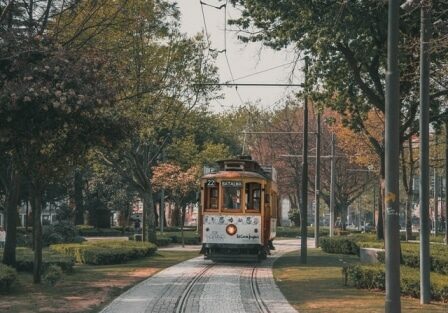Rent costs and property prices in Porto
It can be difficult sometimes to know whether to buy or rent a house. We know that buying a property can be a big investment. However, given the popularity of Porto as a tourist destination, plus the increasing renting costs, you may find that buying property is a better investment in the long run. Regardless of your choice, in this part of our cost of living in Porto article, we’ll delve into the rent costs and property prices in this charming northern city.
Porto rent prices
According to data from Numbeo, last updated in June 2022, the average cost of rent in Porto Portugal is 27% cheaper than an apartment in Lisbon. When looking at cost of living Porto vs Lisbon, rent is increasingly the key difference. To give you some indication of the cost of rent in Porto Portugal, here we’ll provide you with some price brackets below (rounded up or down):
- A one-bedroom apartment in the city center – €701
- A three-bedroom apartment in the city center – €1,279
- A one-bedroom apartment outside the city center – €531
- A three-bedroom apartment outside the city center – €910
The rent prices in Porto will vary depending on which neighborhood you opt for, plus the size of the apartment, the age of the apartment, and other factors. Some apartments will include utilities, while for others you will be required to pay extra for them.
Property prices in Porto
Property prices in Porto, as with all cities, will depend greatly on whether you live in the center of the city, or in the suburbs. In general, the closer you live to the city center, the more expensive it will be. However, some neighborhoods in the city will evidently be more desirable, and therefore, more expensive than others.
In the city of Porto, the average asking price for an apartment in 2020 was €3,328/m2, and for the entire metropolitan area of Porto, was €2,402/m2. It is important to note that these are the average asking prices. The transaction price can be either higher or lower than this. Also, Porto has many different neighborhoods, up-and-coming districts, traditional housing, and properties with sea views. Each will have its own unique characteristics, advantages, and price bracket.
You can see more about the prices and different neighborhoods in our article here.
Food prices
Food prices are usually a good indication of the price of a city and if you are looking into the cost of living in Porto, you’ll be pretty pleased by the affordability – and quality – of the produce. With fresh fruits and vegetables, local fish, and good quality meat, you will be able to eat well. Here we’ll give you an indication of the prices of some daily essentials in Porto. The data is from Numbeo.
Milk (regular), (1 liter) | €0.64 |
Loaf of white bread (500g) | €1.13 |
Rice (white), (1kg) | €1.92 |
Eggs (regular) (12) | €1.92 |
Local cheese (1kg) | €8.04 |
Chicken filets (1kg) | €5.18 |
Beef round (1kg) | €9.52 |
Apples (1kg) | €1.78 |
Banana (1kg) | €1.26 |
Oranges (1kg) | €1.33 |
Tomato (1kg) | €1.59 |
Bottle of wine (mid-range) | €4.00 |
Domestic beer (0.5-liter bottle) | €1.05 |
Imported Beer (0.33-liter bottle) | €1.83 |
Restaurants and eating out
The north of Portugal, including Porto, has some of the best gastronomy in the country. You will find many family-owned restaurants serving up delicacies, and very affordable meals. Alongside this, Porto is home to many luxury and Michelin-starred restaurants, if you are celebrating a special occasion.
According to Numbeo, you can have a meal in an inexpensive restaurant for €8. You will also find a wide choice of cuisines in Porto, as the city has gradually become more international. Note that for luxury restaurants you can expect to pay international prices.
Cost of utilities
It is important to understand the average cost of utilities per month as this can have a significant impact on the cost of living in Porto. To give you an indication, basic utilities (electricity, heating, cooling, water, and garbage) for an 85m2 apartment will cost you around 107€ per month. One minute of a prepaid mobile local tariff, without any discount or plan, will cost you 0.18€. Internet (60Mbps or more) will cost you approximately €34.
Note that with utilities, this will depend greatly on your usage. One good thing about living in Portugal is that the climate is very usually very good, and you will not need to spend much of the year on heating. However, the winters can be cold inside, particularly in Porto and the North of the country, so be prepared in advance.

Transportation costs
Porto and Lisbon are the only two cities in Portgual that have a Metro system in place. In Porto, it is pretty easy to get around, with the metro, buses, and trams, all easily available. As with Lisbon, the metro service is very efficient and affordable, so this is a very good option for city dwellers. A one-way ticket on local transport will cost you €1.45 and a monthly pass will cost you €40. If you are driving in Porto, gasoline will cost you €2.01. When budgeting, it’s good to know that the cost of living in Porto, with regards to getting around the city, will not break the bank.
Taxis are also usually more affordable than in other Western European cities. However, for even cheaper fares, you have Uber to get around easily.
Educational costs
If you are planning to move to Porto with children, you’ll be pleased to know that there are several options open to you. You have public schools, private schools, and international schools.
Public education is free for all Portuguese citizens and legal residents in Portugal. However, if you choose private education then you will obviously have to pay a fee. In Portugal, this usually falls between €800 and €1,500 per month for primary through to high school. Extra costs that you will need to factor in are book fees, enrollment fees, and, if the school requires a uniform, then you will need to pay for this as well.
International schools will cost you around €1,500 and there is a wide range of very good quality international schools in and around Porto. The cost of schooling in an international establishment will vary from school to school and, as with public schools, there will be extra costs such as enrollment fees, books, and so on.
Many international students flock to Lisbon, Porto, and Coimbra, among other universities in the country to study. The universities in the country are very good and internationally recognized for their excellence and long traditions.
With universities, you also have public and private ones. Public universities have a fee limit that can change annually but that, recently, has been a maximum fee of €900. For private universities, they will cost an average of €3,000 per year.
You can learn more about education in Portugal in our article here.
Healthcare costs
For Portuguese residents and citizens, healthcare is almost completely free, with the exception of some procedures, such as visiting the emergency room or taking a diagnostics exam.
For private healthcare, you will be required to pay an average of €40 to €50 for a doctor’s appointment in a private healthcare facility, while yearly fees can cost €400. A comprehensive healthcare cover will cost you around €1,000.
You can find out more about the healthcare system in Portugal here.
Portugal Visa options
To live in Portugal, you’ll want to know about the visa options on the table. In this part of our cost of living in Porto article, we’ll run over the Portugal Golden Visa and D7 Visa.
Portugal Golden Visa
The Portugal Golden Visa, launched in 2012, is one of the most popular residency-by-investment schemes of its kind in the world. If you are looking to move to Portugal then this could be a good option for you, with starting investments from €250K.
In brief, here are the investment options available for the Portugal Golden Visa:
- Fund Subscription: Make a contribution to a qualified investment fund worth at least €500,000
- Investment or donation in the arts or reconstruction of national heritage with a donation of at least €250,000
- Scientific Research: Science or Technology research contribution of at least €500,000
- Creation of ten jobs: Creation and maintenance of ten jobs during the required period
- Share capital and job creation: Incorporation of a company or reinforcement of a company’s share capital, in either case with an investment of €500,000, combined with the creation of five or maintaining ten jobs (5 of them permanent)
Important notice: The Portugal Golden Visa changes 2023
For more information on the Portugal Golden Visa, you can consult the following article:
Portugal D7 Visa
If you are not looking to invest heavily in Portugal, then the D7 is probably the perfect visa option for you. The D7 Visa – also referred to as the Passive Income Visa or Retirement Visa – is an affordable option that allows non-EU citizens to secure Portuguese residency provided that they have sufficient funds to sustain themselves during their stay in Portugal. Note that EU citizens can live in Portugal without the need for a visa. They will simply need to obtain a Residence Permit if they want to live in Portugal for more than three months.
A recognized stable income includes real estate, pensions, financial investment, and other proof of consistent income to demonstrate you have enough funds to sustain yourself. This visa is therefore perfect for retirees, entrepreneurs, and other expats. To qualify, you will need to earn a minimum wage, set out by the Portuguese Government.
For more information on the Portugal D7 Visa, you can see our article here.
Porto life cost: Conclusion
Porto has fast become one of the best European cities for expats. Alongside this, the city is very affordable and you should be able to find everything from daily essentials to property prices attractive, at least compared to other cities in Western Europe. Indeed, you should be pleasantly surprised by the cost of living in Porto. With beaches close at hand, welcoming locals, and some of the best food and wine in Europe, you’ll quickly come to find why this historic town has become the home of expats from across the world.
If you are looking to purchase property in Porto, our real estate division, Goldcrest, can help you with securing the perfect option for you. We know that each person is looking for something different, which is why we provide a tailored service for each client.
For further useful information, you can check out the article below:
Also, Portugal ranks in 12th position in Global Citizen Solutions’ pioneering Quality of Life Index, part of our innovative way to uncover the true value of a passport. This index factors in the cost of living, alongside the Sustainable Development Goals, levels of freedom, happiness levels, migrant acceptance, and environmental performance.
Frequently asked questions about the cost of living in Porto:
How much money do you need to live comfortably in Porto?
The cost of living in Porto is quite affordable. A family of four can live in Porto for approximately 2,118$ (2,026€) without rent. A single person’s estimated monthly cost is 601$ (575€) without rent. The cost of living in Porto for a couple will be something in between.
Is it expensive to live in Porto?
So, is Porto expensive? When looking at living in Porto, Portugal pros and cons, one of the advantages of living in Porto is the cost of living and high quality of life. Porto is a relatively cheap city to live in when compared with other Western European cities.
Is Porto a good place to live?
Porto is a very good place to live for expats. The city is more affordable than Lisbon, has a very good food and drink scene, welcoming locals, and excellent natural beauty surrounding the city, from beaches to national parks. For families, there are also excellent education facilities, and healthcare in Portugal is also of a very high standard. If you are contemplating moving to Portugal, Porto should definitely be on your radar.





